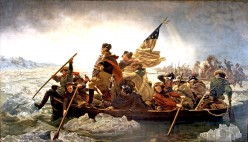My Kids Love History--and Yours Can Too!
A homeschool parent recently confessed to me that she was having the hardest time interesting her children in history. What makes it worse is that her husband was has a bachelor�s degree in history and she is a genealogy genius. Clearly both of them have a love of all things history which has been lost on their bright and attentive kids. She asked me for advice.
As a child, I went to a public school and learned the rote repeating of dates and places in American history that turns most kids� stomachs: In 1620, the Pilgrims landed on Plymouth Rock; in 1776, the thirteen original colonies declared their independence from Britain; a few years later, the War of 1812 took place; a War Between the States in the mid-19th century, and don�t forget those two World Wars, Korea and Vietnam. Following the topics in class was like pulling teeth: We were memorizing dates and places and nothing more. I suspect a lot of teaching these days still uses this tack, and it�s continuing to turn the children of America off from history. Many times their parents are no help because they didn�t enjoy the study of history in their own youth so they have a prejudice against it that the kids pick up on.
What kids�and their parents�need to understand is that history builds upon itself. A vacuum does not exist in the history of the world where each event is independent of itself. The various wars fought in the United States had their beginnings in the previous military actions: One cannot understand World War II unless they have studied World War I (The War to End All Wars). Similarly, the American Civil War did not simply happen on its own, but had its own foundations in the very founding of the fledgling United States. I once knew a man who was confused as to when the War of 1812 took place, was it before or after World War II? This man had flunked US History in high school four times, and he was of pretty average intelligence. Certainly there was a disconnect somewhere in his education and I am fairly certain it has to do with how the subject is presented.
All this is to say that history is a continuum.
It doesn�t, however, solve the dilemma for my friend, who struggles to keep her kids� attention on the subject at hand. I had a more unique perspective: Rather than pull out the dates and places of the events, try to pull out various stories within the history to make it come alive. Put that history into action! One brilliant history teacher did that for me in 9th grade and I�ve never forgotten the lessons.
Mrs. Ness was a tall Scandinavian woman who taught American history in our high school, a tough teacher with a heart of gold. And she had a hint of the theater in her. Rather than read the text, she would have us kids reenact various scenes in history. I remember vividly Washington Crossing the Delaware because a guy named Dave stood up in our �boat� and some of us had to row. We thought it a bit silly at the time, but now, looking back, I see the brilliance of it. By making us reenact history, she reinforced the lesson. I can still see her shooting the guns at Gettysburg.
I graduated from college with a BA in History, in large part because history came easy to me, but I had the good fortune to find a couple history professors who continued in the vein of my beloved Mrs. Ness. They built on integrating history into life, that history was actually REAL to the people who were living it, and in turn, that history becomes our history. We read books of the period, political pieces, listened to music from those times (who can forget the opera reel �Turkey in the Straw� from the American Civil War), visited art museums and living history museums. We had a smorgasbord of history at our disposal and we learned as much as we enjoyed in those classes.
My friend�s children had never seen history in this light: They�d started out in public school and there was a decided lack of history emphasis, which I noticed with our own children who attended at the same time. The teachers were always impressed with our kids because they would come to school with what they viewed as �fun� history facts. It was natural for my husband and me to expose the kids to history/educational videos, books, and toys that perhaps replicated what children from the past would play with, i.e. a wooden hoop toy driven with a wooden stick, a string ball and wooden cup, mancala, Parcheesi. While the other kids in their classes tended to view our children as overeducated nerds, the teachers did tell us they enjoyed the facts our kids shared with the class and that they were helping to drive discussion so they could delve deeper into the subject. This said, it helped immensely that they could bring show and tell items pertaining to the particular unit being taught.
I reminded my friend that she needed to make history come alive. While her children were finding some enjoyment in cartoon-type (graphic) history books, she started making sure they had a few more story books pertaining to the time period they were working on, in this case the Middle Ages. The family, who is not Catholic, studied the lives of the saints of the Middle Ages, like Joan of Arc and St. Thomas Aquinas. They worked on scientific advances during that time, with Renaissance men like DaVinci and Michaelangelo for art and invention, with special emphasis on the lives of everyday people. One of their kids has a fascination with castles and knights, so there was another lesson, which involved using castle-blocks as building materials, and learning about King Arthur and the Knights of the Round Table. As the kids became engrossed in their work, they didn�t even realize they were learning history. It was a win-win situation for my friend and for the kids.
While homeschooling and regular schooling are different, it is possible to enhance your child�s history learning with supplemental materials wherever they attend school. You don�t have to be a history whiz or a college-educated parent to check out items from the library to work with your child. Encourage your child(ren) to read and explore more than just the standard textbook learning offered them at school. Sit, read and discuss what your kids are finding out. Ask questions and seek out the answers together.
Learning is a life-long pursuit, not completed with the end of a class or the end of school: It�s something we must all work and strive for, to teach our kids, the future generation, about the past. For as I stated before, the past is not in a vacuum. The people who lived through those times were living, breathing, feeling individuals who struggled with many of the same kinds of issues that we do today�sometimes even worse ones than we face. It helps to know how those issues were handled in order to know how to proceed in the future.
This would make a great hub. What is it doing in the forums?
It's my first time posting so I'm not quite sure what I'm doing here yet. Thanks for the advice!
- Muldaniaposted 13 years ago
0
History was always my favourite subject at school. I especially enjoyed the history of the Romans in Britain, as well as the Vikings, Saxons, Normans etc. Learning about peoples who have gone before, I felt almost as if I could reach out and touch them. My first history teacher, Mr. Gent had taught the grandson of Howard Carter, and was very keen on Stonehenge.
- LillyGposted 13 years ago
0
I hated history as a child but found as I got older, I loved it! It first started with a fixation on the ancient Egyptian culture and grew from there. I do have my favorite eras though, as most people do but something about learning of other's lives and the impact made on the world is exciting.
Growing up, I was never a fan of history. I just never found a love or passion for it. Perhaps the content didn't interest me. Or my teachers never found a way to make it interesting. But it's amazing how life changes. Because now, as a grown adult and father, history is the one thing I WANT to know more about. It's very fascinating on so many levels to learn about our past and how we got her, especially family. So I'm trying to come up with ways to help my son see that same 'fun' side in history. And so far it's working!

Related Discussions
- 17
Beyond.........Astounding, Even Shocking........Flabbergasting......
by Grace Marguerite Williams 9 years ago
Several young Americans were questioned about World War II. Many of those questioned didn't know what World War Ii was. Also, they didn't know how the Allied & Axis powers were. It is further astounding that they didn't know WHO won World War II. Now in another vein,...
- 53
A Quiet Revolution in High Schools and Colleges
by Susie Lehto 9 years ago
I came across this article on Facebook. Millennials can’t help itMany of us shake our heads at how young people can possible have the worldview they have, one evidenced by their support of Socialists. It is not their fault. It is the fault of the curriculum they are taught in our public...
- 38
Can You Face Your Own History?
by Sooner28 12 years ago
http://rabble.ca/blogs/bloggers/gerry-c … y-revealedThis article got me thinking. 65,000 civilians were slaughtered, purposely, by American forces.American history began with the genocide of the Native Americans and the theft of their land.We also killed untold numbers of civilians...
- 25
Is poor parenting the reason children don't value education?
by G. Diane Nelson Trotter 7 years ago
Is poor parenting the reason children don't value education?Are the growing number of absentee parents and uneducated parents the reasons most children in urban schools do not value education?
- 14
Florida Anti-CRT law full of ambiguity?
by Credence2 3 years ago
And, yes, as you see by my copy, I have read the bill. This is stirring up a lot of dismay among educators and yours truly as an occasional sub in the Social Sciences area for county's public school system...........(f) An individual should not be made to feel discomfort,298 guilt, anguish, or any...
- 73
Do you think home schooling your children is a good idea?
by steve-bc-ca 6 years ago
I was involved in a forum discussing whether teachers should be held accountable for a students success. I started thinking about the possibilities of home schooling, but I don't have any information on the subject and I noticed there were no hubs on the topic. What do you know about it and what is...









